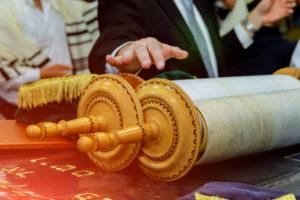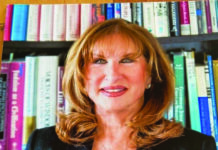
By Rabbi Barry Dov Lerner
Parshat Bo
Our weekly Torah portion, Bo (Exodus 10:1–13:16), is packed with drama, bursting with the roots for Jewish observance. It begins with the familiar conclusion of the Ten Plagues, even if we know the end of the Passover plot.
However, one “quiet” verse, which is almost overlooked in importance, interrupts the story; the words are not dramatic, nor does it fill us with spiritual awe. But it may well be the most important verse in this sedra.
But first, let’s look at the “big picture” of the Exodus from slavery. We begin with yet another round of negotiation between Moses and Pharaoh and the next plague of locusts. The Egyptian courtiers now urge Pharaoh to permit Israel to go to worship their God. He refuses, and the locust swarms all agriculture that survived the hailstorm. Once again, Pharaoh relents, and, when the locusts leave, he reneges yet again.
Moses is then instructed by God to bring unannounced the ninth plague of total darkness, causing Egyptians to stay at home — “national lockdown.” Pharaoh summons Moses to admit defeat and the darkness is lifted. But once the plague is removed, it is the same old story: Pharaoh refuses to let them go.
Meanwhile, the Israelites are instructed how to prepare to leave. Firstly, they are to request objects of silver and gold from their Egyptian neighbors. Secondly, they are to dedicate and then roast a lamb to eat with unleavened bread and bitter herbs, while painting their house doorframe with the lamb’s blood.
The portion continues with instructions for the future celebration of the seder and Passover, the basis for three of the four famous Mah Nishtanah.
Moses warns Pharaoh that the firstborn of Egypt, from the highest to the lowest, peasant to Pharaoh, human and animal, will die about midnight. Now, “everyone gets the message” in the contest between Pharaoh and Israel’s God “let my people go.”
Our sedra concludes with the importance of memorializing our redemption from Egyptian bondage with pidyon haben for redeeming the human and animal firstborn of Israel, the feast of unleavened bread Hag HaMatzot, and concluding with tefillin containing memories of the Exodus.
Which, then, is the “sleeper verse?”
“This month shall mark for you the beginning of the months; it shall be the first of the months of the year for you.” (Ex. 12:1-2)
According to many traditional commentaries, this verse is the first commandment given to the Children of Israel just before their exodus from bondage and before the “Aseret Hadibrot” (Ten Commandments). It was, as Professor Gerson Cohen taught: (z”l, my teacher and past chancellor of JTSA): The most significant legacy of this Torah portion is the proclamation of the foundation of the Hebrew calendar.”
Why? The present Jewish calendar is lunisolar, the months being reckoned according to the moon and the years according to the sun. A month is the time between one conjunction of the moon with the sun and the next. As Cohen wrote: “What is important is that this calendar which became the foundation of the Jewish calendar that is still followed and observed, gave the children of Israel an autonomous way of keeping time.”
In the words of Samson Raphael Hirsch (1808–1888), the founder of contemporary modern Orthodoxy: “The Jewish calendar is the Jewish catechism, for it is the most concise summary of what we remember and what we stand for.”
In short, the newly freed are now in charge of their own time and the labor of their hands. They will observe both our agricultural celebrations and also our historical events.
As they assume control for their own lives living in freedom, they accept responsibility for their own decisions and their opinions. The calendar required human understanding of sun, moon and stars but not as divinities. Literally, we — not God — determine when Shabbat, the festivals and holy days occur.
Let me conclude with a wonderful rabbinic Aggadah about Rabbi Eliezer ben Hyrcanus, who disagreed vigorously with Rabbi Joshua and all his colleagues in the Academy.
Eliezer calls up one miracle after another, to prove him correct. Finally, Eliezer calls upon God for support, and a “Bat Kol,” spoke to the Academy: “Why are you disagreeing with Rabbi Eliezer? You know the law is always in accord with him!” Rabbi Yehoshua then stood up and defied the Bat Kol on his feet and said: It is written: “It is not in heaven” (Deuteronomy 30:12).
When the Talmud asks, “What do these words mean, “It is not in heaven?” Rabbi Yirmeya says: “Since Sinai, we don’t obey a Divine Voice, as the Torah teaches: ‘majority rules.’” Because a majority of rabbis disagreed with Rabbi Eliezer and the heavenly voice, Jewish law follows the rabbis — for millennia to come.
Our Torah begins in Genesis with the creation as a universal history. The origin of the Jewish people is in the Book of Exodus. Genesis relates the mythology of our ancestors journeying to Egypt to survive, but there we were enslaved by a Pharaoh who recognized no authority greater than himself. Passover and the telling of the Exodus surround this one verse, on either side.
Nisan becomes the first month in the new Jewish calendar in our sedra, and Passover celebrates the beginning of the Jewish people. l
Rabbi Barry Dov Lerner is the president of Traditional Kosher Supervision, Inc. The Board of Rabbis of Greater Philadelphia is proud to provide diverse perspectives on Torah commentary for the Jewish Exponent. The opinions expressed in this column are the author’s own and do not reflect the view of the Board of Rabbis.





